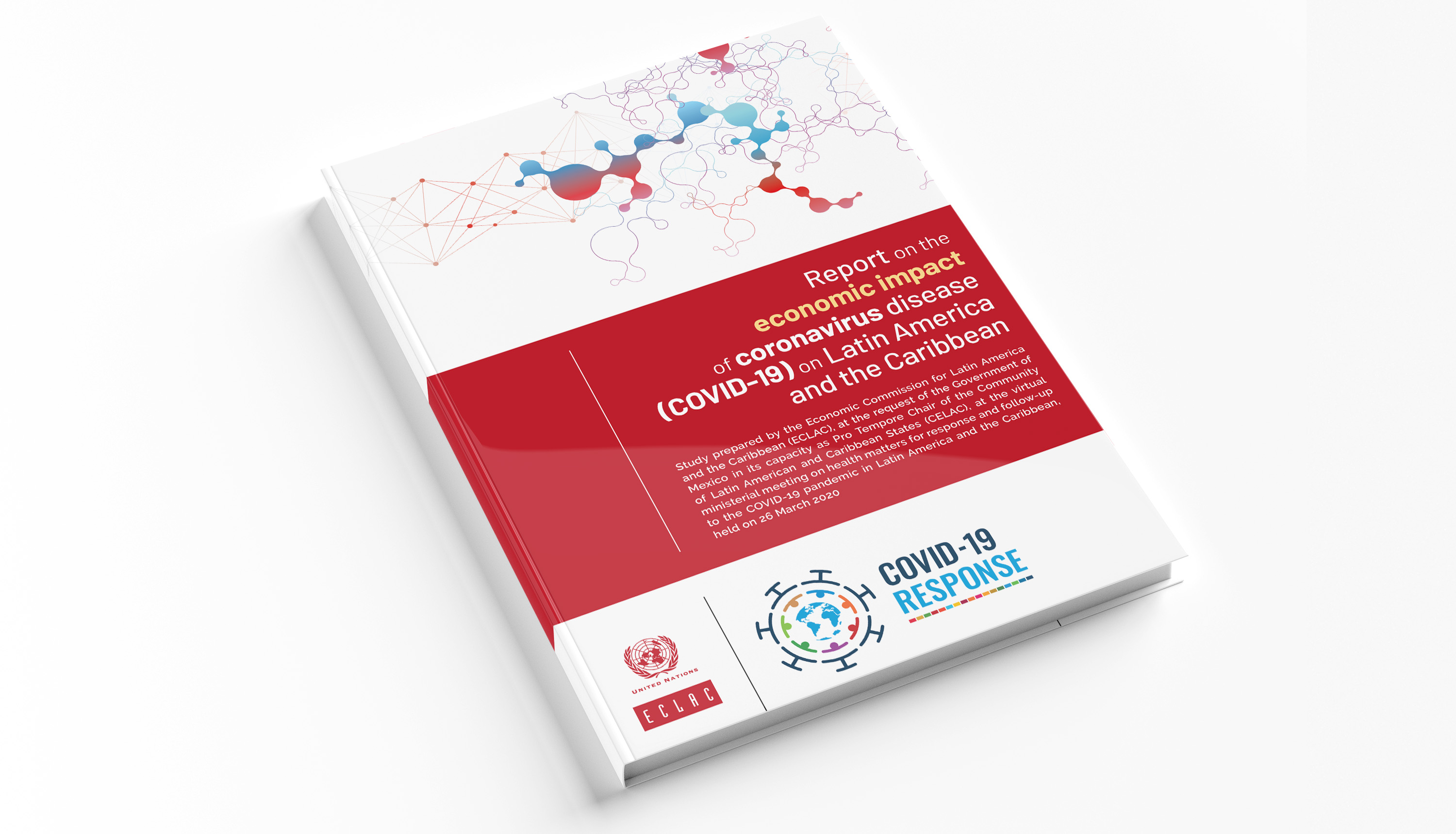ECLAC Presents to the Community of Latin American and Caribbean States a Study on the Economic Impact of COVID-19 that Includes an Observatory on Measures and Instruments along with Recommendations and Proposals for Confronting the Disease
Work area(s)
At a special meeting convened by Mexico in its capacity as Pro Tempore Chair of CELAC, the Commission’s Executive Secretary, Alicia Bárcena, submitted a detailed report on the region’s situation to the countries along with recommendations to support the post-pandemic recovery.

The Executive Secretary of the Economic Commission for Latin America and the Caribbean (ECLAC), Alicia Bárcena, submitted to the member countries of the Community of Latin American and Caribbean States (CELAC) the actions, proposals and policy recommendations that the Commission has developed for providing follow-up and for confronting the coronavirus crisis, during a private, high-level virtual meeting held today.
The meeting, entitled “Towards a new global economy: A university-ministerial gathering,” was convened by CELAC’s Pro Tempore Chair, currently held by the government of Mexico. It was led by that country’s Foreign Secretary, Marcelo Ebrard, and drew the participation of representatives of Foreign Ministries and other authorities from the 33 Latin American and Caribbean countries that belong to the organization, along with rectors and deans of trade and economics from the Association of Universities of Latin America and the Caribbean (UDUAL), including Enrique Graue Wichers, Rector of the National Autonomous University of Mexico (UNAM) and Rodrigo Arim, Rector of the University of the Republic, in Uruguay.
On this occasion, Alicia Bárcena presented the Report on the economic impact of coronavirus disease (COVID-19) on Latin America and the Caribbean, a study produced by ECLAC in response to a request made by the government of Mexico, acting as CELAC’s Pro Tempore Chair, at the Virtual Ministerial Meeting on Health Matters for Response and Follow-up to the COVID-19 Pandemic in Latin America and the Caribbean, which took place on March 26, 2020.
In her presentation, the senior United Nations official specified that, in response to CELAC’s request, ECLAC has set in motion a COVID-19 Observatory to contribute to the analysis and follow-up of actions and measures taken by CELAC’s 33 countries to tackle the pandemic; it has produced diverse reports and studies with comparative data to inform policymakers about sectoral issues; it has held meetings with government representatives at the highest level to support solution-building and the exchange of experiences (gatherings that will continue to take place over the coming weeks); and it has made short and medium-term recommendations and proposals.
“The pandemic has sent shockwaves through societies and economies, forcing us to be more creative, increase experience-sharing, strengthen peer learning and take advantage of multilateralism at a time when cooperation and collaboration among stakeholders is vital and no one can save themselves unaided,” Alicia Bárcena sustained.
ECLAC’s Executive Secretary highlighted that the COVID-19 Observatory in Latin America and the Caribbean, implemented by ECLAC with the support of United Nations resident coordinators in the region, is a space for regional communication to share analyses of economic and social effects at a national and regional level with regard to the state of health systems, labor structures, employment, schooling, production, trade and macroeconomic policy.
This tool includes a COVID-19 Geo-portal which, through an interactive map, provides access to information on the actions taken by the region’s countries to confront the pandemic. This information is disaggregated by the type of measure, such as restrictions on movement, health, the economy, work, social protection and education, and it will soon include actions related to gender, she explained.
Bárcena indicated that ECLAC has already published three Special Reports on COVID-19 that address the socioeconomic effects of the pandemic, as well as specific studies on the production of official statistics; general recommendations for caring for older persons from a human rights perspective; the crisis of care in Latin America and the Caribbean; the impact of restrictive policies on the international trade of medication and medical supplies; the effects on tourism; people with disabilities; the impact on food systems; opportunities for digitalization; and the 2030 Agenda for Sustainable Development in the new global context, among other topics.
Furthermore, the Commission has held virtual meetings with high-level government representatives related to the issues in its work plan, the activities of ECLAC’s subsidiary bodies, and the COVID-19 crisis. Officials from United Nations agencies, funds and programs have also participated in these gatherings along with resident coordinators, who are key actors for implementing actions on the ground. To date, meetings have been held with authorities from national statistical entities; ministers of social development; ministers and senior authorities from the mechanisms for women’s advancement in Latin America and the Caribbean; finance ministers in the region; ministers and senior authorities from the ministries and governing bodies in charge of science, technology and innovation; ambassadors and representatives of the permanent missions from the region’s countries to the United Nations; civil society organizations; and officials dedicated to environmental matters and climate change from numerous countries. In the short term, additional virtual meetings are scheduled to be held with planning ministers and authorities from Latin America and the Caribbean, as well as authorities focused on ageing and older persons in the region.
In her presentation, Alicia Bárcena reminded CELAC’s members and university authorities that prior to COVID-19, Latin America and the Caribbean was already exhibiting low growth, limited monetary and fiscal space, and rising levels of poverty and inequality. She added that the pandemic will cause the biggest recession ever experienced by the region, with a contraction estimated at -5.3% in 2020, a -15% drop in trade, and increases in unemployment, poverty and inequality.
ECLAC has proposed that countries immediately implement a basic emergency income (BEI) equivalent to one poverty line and, in the short term, expand fiscal space to design effective measures and strengthen mechanisms to bolster income, employment and MSMEs. Meanwhile, in the medium term, it will be necessary to formulate responses for a post-COVID world that will bring about changes in the model and the productive structure, with greater equality and sustainability, Bárcena warned.
“A Welfare State is needed, based on a new social (fiscal, social and productive) compact that includes the universalization of access to rights, a universal basic income and a care system. We must further regional integration in a new economic geography,” she insisted.
“We need greater productive, trade-related and technological integration to have an impact on the new international economic geography, devising industrial and technological policies to create and strengthen productive capacities and to drive productivity, employment and sustainable growth. All of this in order to head towards a green reactivation and a recovery via a big push for sustainability,” she stated.
“Progressive fiscal compacts are needed with more direct taxes on personal income, especially for the wealthiest 1%, with the aim of moving towards a more inclusive and sustainable development model based on a new relationship between the State, society and the market,” Alicia Bárcena emphasized.
Related content
Informe sobre el impacto económico en América Latina y el Caribe de la enfermedad por coronavirus (COVID-19)
Presentación de Alicia Bárcena, Secretaria Ejecutiva de la CEPAL, en la reunión “Hacia una nueva economía global: Encuentro universitario ministerial”, convocada el 28 de mayo de 2020 por la…

“Hacia una nueva economía global: Encuentro universitario ministerial”-CEPAL presenta a la Comunidad de Estados Latinoamericanos y Caribeños el estudio sobre impacto económico del COVID-19
En reunión especial convocada por México en su calidad de Presidente Pro Témpore de la CELAC, la Secretaria Ejecutiva de la Comisión, Alicia Bárcena, entregó a los países un detallado informe sobre…
Related link(s)
Country(ies)
- Latin America and the Caribbean
Contact
Public Information Unit
- prensa@cepal.org
- (56 2) 2210 2040